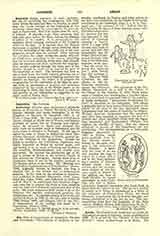

Asperges (Latin, aspergere, to wash, sprinkle), the rite of sprinkling the congregation with holy water before the principal Mass on Sunday, so called from the words intoned at the beginning of the ceremony, taken from Ps. 1, throughout the year except at Eastertide, when Vidi aquam, from Ps. cxvii, is intoned. It precedes every other ceremony that may take place before the Mass, such as the blessing of palms or of candles. It is performed by the celebrant priest wearing vestments of the liturgical color of the day. It is omitted when the Blessed Sacrament is exposed, though many rubricists think that the sprinkling of the altar only, not of the congregation, should then be omitted. After intoning the antiphon the priest recites the psalm Miserere or Confitemini, according to the season, sprinkling first the front and platform of the altar, then himself, next the ministers and choir, and lastly the congregation, usually walking through the main part of the church, though he need not go beyond the gate of the sanctuary or choir. The ceremony has been in use at least from the tenth century, growing out of the custom of early antiquity of blessing water for the faithful on Sundays. Its object is to prepare the ‘congregation for the celebration of the Mass by moving them to sentiments of penance and reverence suggested by the words of the fiftieth psalm, or by impressing on them that they are about to assist at the sacrifice of our redemption as suggested in the psalm used at Easter time.
JOHN J. WYNNE

